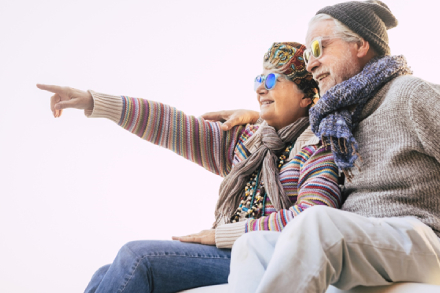Orthopaedic Precautions For Seniors In Cold Weather

According to the current statistics, over 12 crore senior citizens (people over the age of 60) in India. Thanks to improvements in medical care, that number will continue to go up as life spans increase. While people today live longer than ever before, the biological changes that occur with time mean that the resistance to illness and injury that was there when a person was in his 30s or 40s has diminished, so the elderly remain at higher risk of medical disorders. Among the most common of these are orthopaedic problems caused by injuries to the frailer bodies or degenerative diseases. These include fractures, dislocations, osteoarthritis, and osteoporosis. Cold weather increases the risk of orthopaedic issues. A few simple orthopaedic care steps will enable seniors to increase their protection level and reduce the likelihood of problems.
Weight Control
Many people tend to put on excess weight as they become older. This is especially true in cold weather when staying indoors is warm and comfortable. The dangers of being overweight and the increased risk of cardiac conditions and diabetes etc., are well known. What is often not appreciated is increased weight on bones and joints, especially older ones. It is estimated that for every 5 Kg. of weight gained, the risk of osteoarthritis increases by 35%. Excess weight also places more stress on the muscles, tendons, and ligaments. Besides the increased risk of injury to these tissues, the pressure on them will increase the pressure on bones and joints, leading to a higher risk of fractures.
Exercise
The benefits of regular exercise are well known. What is essential for seniors is getting the right kind of activity – the exercise regimens of the younger generation will not be suitable for you. Focus on exercises that include stretching, walking, swimming and cycling, and other low impact and low-stress actions. Avoid activities that put stress on your joints, such as knee bends, etc. Exercise is essential even if you have orthopaedic problems – it will keep the condition from becoming worse. Check with your doctor before starting any exercise routine to ensure that the effort you put in will bring you the results you want. If cold weather makes it difficult to exercise outdoors, switch to exercises that can be done indoors. Always ensure that you do your warm-up stretches before starting to exercise, especially in cold conditions. This will help to prevent sprains and strains.
Develop A Strong Core
The mid-section of your body, or the core, is where your limbs connect and where your spine is located. Developing strong abdominal muscles will help protect bones and joints and reduce the stress on the backbone. For seniors, the use of weights or high impact exercises is not advisable – the strain on the body may be too much. Yoga and Pilates are the better options that will build core strength without overstressing the body.
Think Twice In Cold Weather
We all have various activities and actions we perform without giving it much thought. An example of this is moving a small piece of furniture so it can be cleaned. While this may not usually place stress on the body, in cold weather, when the muscles and tight and contracted, the strain is more and the risk of injury greater. In cold weather, be extra cautious about any physical activity that may pressure your body.
Stay Warm
People living in places like Chennai, which experiences little cold weather, often think that spending money to buy warm clothes is a waste. That can be a mistake. When the temperature drops, either where you live or when you travel to a colder region, the cold increases the stress on your joints, muscles, and ligaments. The chances of orthopaedic injuries are greater. A disorder that begins in this way may stay with you for the rest of your life. In cold weather, always wear warm clothes to keep your joints and muscles from becoming tight due to the cold.
Wear Comfortable Footwear
Wear shoes that are comfortable and give your feet, especially the arches, the support they need. This will promote proper alignment of the lower limbs and reduce stress on the core. Women who wear high heels have a higher risk of getting knee, hip, and back pain. Once again, the risk of footwear related orthopaedic disorders increases in cold weather.
Regular Checkups
Regular medical checkups are essential, and the necessity increases as you get older. The risk of disorders increases with age, but the earlier a problem is spotted, and treatment started, the greater the chances of recovery and the faster it will be. Regular orthopaedic checkups will be able to diagnose an incipient problem, perhaps before you even notice that they are developing. Do not compromise on your orthopaedic health – problems can arise at any time, whether it is cold or not, often with little or no warning. Find the best ortho doctor in Chennai and start your routine of regular checkups. This will go a long way in ensuring that you remain active and pain-free in your senior years.
- Dec 21, 2020
